|
|
|
Sort Order |
|
|
|
Items / Page
|
|
|
|
|
|
|
| Srl | Item |
| 1 |
ID:
094863
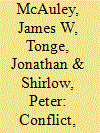

|
|
|
|
|
| Publication |
2010.
|
| Summary/Abstract |
Following the 1998 Belfast Agreement in Northern Ireland, levels of paramilitary violence have declined substantially. Among loyalists, the Ulster Volunteer Force (UVF) and associated Red Hand Commando (RHC) have formally renounced violence, and dissolved their 'military structures', and perhaps the most reticent of all of the major paramilitary groupings, the Ulster Defence Association (UDA), has taken on board the central tenets of conflict transformation, and 'stood down' all of its 'active service units' in the Ulster Freedom Fighters (UFF). Thus, paramilitary violence now is mainly confined to the activities of 'dissident' republican groups, notably the Real and Continuity IRAs, although low-level sectarian violence remains a problem.
Such dramatic societal and political change has resulted in a focus on the roles of formal party political leadership as agents of social change. This gaze, however, tends to obscure other important events such as the efforts, structures and approaches taken at the grassroots level to uphold and sustain conflict transformation and to maintain a reduction in violence. This article provides analysis of the role played by former loyalist paramilitary combatants in conflict transformation, and draws on material obtained through significant access to those former paramilitaries engaged in processes of societal shifts. In both personal and structural terms there is evidence of former combatants working to diminish the political tensions that remain as a result of the long-term inter-communal hostility developed across decades of violence and conflict.
|
|
|
|
|
|
|
|
|
|
|
|
|
|
|
|
| 2 |
ID:
094864
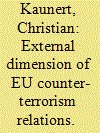

|
|
|
|
|
| Publication |
2010.
|
| Summary/Abstract |
Some very significant policy developments indicate "supranationalisation processes" of EU external relations in counter-terrorism, even in its most significant relationship with the USA. This means that, increasingly, the USA is willing to work with Europe through its institutionalised forum-the European Union. Thus, the EU achieves certain recognition on the world stage in areas previously completely unsuspected-the "high politics" of counter-terrorism. This supranationalisation process proceeds in two stages. Firstly, the construction of an Area of Freedom, Security and Justice (AFSJ) pools a significant amount of national sovereignty at the level of the EU through the establishment of internal EU competences. As a side effect, however, it also constructs an institutionalised structure for external actors, such as the U.S., to deal with. Through dealing within this institutional setting, member states' interests become defined in such a way that increasingly they construct a "European" interest related to counter-terrorism.
|
|
|
|
|
|
|
|
|
|
|
|
|
|
|
|
| 3 |
ID:
094867
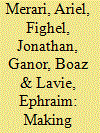

|
|
|
|
|
| Publication |
2010.
|
| Summary/Abstract |
Knowledge about the ways in which suicide attacks are recruited and prepared and on the motivation of suicide bombers and the factors that influence the decisions of organizers of suicide attacks has so far been sketchy and sporadic, derived mostly from media sources. In this study, 15 Palestinian would-be suicides and 14 organizers of suicide attacks participated in semi-structured interviews designed to fill this lacuna. The paper focuses on the self-reported feelings and behavior of the suicide bombers from recruitment to dispatching, as well as on the organizers' self-reported views and decisions concerning suicide attacks.
|
|
|
|
|
|
|
|
|
|
|
|
|
|
|
|
| 4 |
ID:
094866
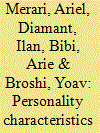

|
|
|
|
|
| Publication |
2010.
|
| Summary/Abstract |
This is a report of a direct psychological examination of suicide, or "martyrdom" terrorists and of organizers of martyrdom attacks. Assessments of the personality of self-martyrs have so far relied on biographical material drawn from secondary sources. In the absence of direct psychological examinations, the debate on the existence of distinctive personality factors among suicide terrorists has so far remained at the hypothetical level. This study subjected failed Palestinian suicide terrorists, a control group of non-suicide terrorists, and a group of organizers of suicide attacks, to clinical psychological interviews and tests. Significant differences were found between suicide and non-suicide terrorists and between these two groups and the organizers of martyrdom attacks. Two main personality styles were found among the would-be suicides. Members of this group had a significantly lower level of ego strength than the organizers of martyrdom attacks. Most of the would-be martyrs displayed a dependent and avoidant personality style, a profile that made them more amenable to group, leader, and public influence. Others were assessed as having an impulsive and emotionally unstable style. Some of the would-be martyrs but none of the control and organizers groups' participants displayed sub-clinical suicidal tendencies. Significantly more martyr than control group members displayed symptoms of depression.
|
|
|
|
|
|
|
|
|
|
|
|
|
|
|
|
| 5 |
ID:
094862


|
|
|
|
|
| Publication |
2010.
|
| Summary/Abstract |
This article examines: (1) the obvious reasons for, and curious absence of, a dialogue between scholars studying new religious movements (NRMs), particularly those responsible for acts of mass violence, and those studying processes of radicalization in home-grown terrorist groups; (2) the substantial parallels between established understandings of who joins NRMs, how, and why and recent findings about who joins terrorist groups in a Western context, how, and why; and (3) the ways in which explanations of the causes of violent behaviour in NRMs are pertinent to securing a more systematic and complete grasp of the process of radicalization in terrorist cells. The latter discussion focuses on the role of apocalyptic belief systems and charismatic forms of authority, highlighting the behavioural consequences of this dangerous combination and their possible strategic significance. Recommendations are made for further research, integrating insights from the two fields of study.
|
|
|
|
|
|
|
|
|
|
|
|
|
|
|
|
| 6 |
ID:
094865
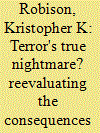

|
|
|
|
|
| Publication |
2010.
|
| Summary/Abstract |
Some scholars argue that terrorism has few adverse consequences for political and civil liberties in democracies and that fears about a reversal of freedoms due to counterterror programs are unjustified. However, anecdotal evidence suggests that democracies respond to terrorism in ways that curtail at least some of the rights that define democratic governance. In an analysis of a large sample of the world's nations, this study finds that terrorism has deleterious effects on regimes' respect for civil and human rights but few consequences for overall political access. I conclude that terrorism has measurable negative influences on particular aspects of democracy.
|
|
|
|
|
|
|
|
|
|
|
|
|
|
|
|
|
|
|
|
|